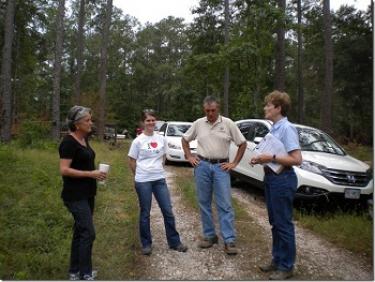Estate Planning Professionals and Tools
There are many tools available to help you realize your vision for your woods. These tools make it possible for you to preserve some or all of your land and pass it down to your heirs while avoiding significant tax burdens or legal problems.
Two tools serve to document your wishes and ensure they’re respected after you’re gone: wills and trusts.
Wills are legal documents that communicate how you’d like your assets to be distributed when you pass away. They’re often used to specify who should receive your home, belongings, and any savings or other funds you have, but they can also be used to record your wishes for your land. Your will should be as specific and clear as possible, so your heirs can know exactly what kinds of activities you wish to allow on your land. Think of your will as the bare minimum: if you choose to use no other estate planning tools, at least make sure your will states how you would like your land to be treated after your death.
Trusts create a legal entity that can hold and manage your assets, under your own direction or the direction of a trustee you designate. When you set up the trust, you can use it to specify what must be done with your land when you are gone. Creating a trust can also help your heirs avoid estate taxes and the costs and delays of court involvement in distributing your assets when you die.
There are also other legal tools you can use to protect your land and your family’s rights.
The form of legal ownership you choose for your land, for example, can make a difference in how easily you can transfer your land and how great your heirs’ tax burden will be. Personal forms of ownership that families have available to them include individual ownership, joint tenancy, tenancy by the entirety, and tenancy in common.
Business ownerships can also be a powerful tool, and are an option for you and your family regardless of whether you manage your woods for income or not. Setting up a general partnership (a joint ownership in which every owner shares profits, losses and liabilities), a family limited partnership (a partnership between members of a family), or a limited liability company (ownership that’s divided into shares) can limit your liability, reduce gift and estate taxes, and make it easier to transfer ownership of your land.
Conservation easements allow you to keep ownership of your land while donating or selling some of the rights to it. They are voluntary agreements between a landowner and a government agency or land trust (usually a conservation organization) to restrict certain kinds of development. Conservation easements can help protect and preserve your land for your heirs while reducing their tax burden—and providing you with peace of mind.
Chances are that you’ll need some professional help to apply these tools and effectively put your plans into action. Some of the experts who can serve you and your family in your estate planning journey include:
Appraisers, who are licensed professionals trained to calculate the current market value of your land based on where it is, its characteristics, and sales of similar properties in your area. It is important to work with an appraiser familiar with valuing land, especially if you’re considering setting up a conservation easement or navigating tax issues.
Foresters are forest experts who have the academic training and experience to accurately assess the health and value of your woods. A trusted forester can help you and your family identify unique or valuable plant communities, wildlife habitat and tree stands; inventory and improve your land’s resources; set up timber harvests and conduct management activities, such as prescribed burns; and develop appropriate short- and long-term plans to meet your goals for your land.
Estate planning attorneys and estate planners specialize in the legal strategies and tools needed for successful estate planning. They can help you better understand your options, particularly if they have experience with landowners and the issues they face. They can also help you draft a will and complete other key steps that protect your legacy.
Certified Financial Planners (CFP®) are professionals trained to guide you through all the facets of financial planning. They can help you take stock of your current financial situation, determine your future needs, and set and achieve long-term goals through investment, retirement, and estate planning.
Tax attorneys or CPAs (Certified Public Accountants) understand the complex tax and financial issues involved in estate planning. The value of your land, how it’s transferred and how it’s owned can all affect your or your heirs’ tax burden, and that burden can be quite high in certain situations. Tax attorneys and CPAs can help you devise strategies and take steps to minimize your taxes and maximize what you leave behind.
Land protection specialists typically work for land trusts and government conservation agencies, and can help you find appropriate land conservation options if protecting part or all of your woods from development is one of your goals.
With any professional assistance, trust and experience are essential. If possible, opt for an estate planning professional who has experience working with landowners and land issues, and make sure you feel comfortable with him or her both personally and professionally.
How can I get more tips?
It’s simple! Enter your email below.

